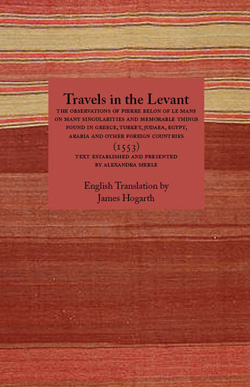First English Translation, by James Hogarth, With an introduction by Alexandra Merle. "When Pierre Belon set out on his journey to the Levant in 1546 he was one of the precursors of the many Frenchmen who travelled about the vast territories of the Ottoman empire in subsequent decades and throughout the 17th century. Before him few westerners had undertaken such a journey and written an account of it, for western interest in the Ottoman possessions was then quite recent.
The capture of Constantinople in 1453 had revealed the existence of the Turks to the western world, but it was some time before they were regarded as a new power to be reckoned with. This came about in 1517, when Sultan Selim I, after defeating the Mamelukes, seized Egypt and the Holy Land, thus adding immense territories to an empire which was already large. Selim also increased his possessions in the Mediterranean, following in the footsteps of his predecessor Beyazit, who had seized many Venetian possessions. By his death in 1521, after a lightning reign which had been a long succession of sensational conquests, Albania and the Morea had been annexed, as well as the greater part of the regions to the south of the Danube, Wallachia, Moldavia and Roumelia.
In the reign of Suleiman, the most glorious of the Ottoman sultans, to whom Europe was soon to give the style of Magnificent, the expansion continued. In the first year of his reign Suleiman took Belgrade. In the following year, 1522, he seized the island of Rhodes, driving out the Knights of St John of Jerusalem. Then he turned on Hungary and won a crushing victory at Mohacs in 1526, thereafter moving on to lay siege to Vienna in 1529. The western powers, particularly the Holy Roman Empire, were now in direct contact with the Turks. Concerned to identify this new enemy and to assess his strength, they set enquiries on foot. Cosmographers sought to establish the origins of the Turks in the writings of the ancients, though without much success, and a great variety of other sources were consulted.
Before 1530 there were very few books about the Ottoman empire apart from some accounts of pilgrimages to Jerusalem which in any case had little to say about the way of life or the political system of the Turks. In France the few books published in this period were mainly translations of Italian works1; two in particular were to become universally quoted sources: a treatise by Spandugino, translated into French in 1519, and above all the monumental work of Paulo Giovio, the Latin version of which, the Turcicarum rerum commentarius, was widely read and translated into French in 1538. The following decade saw a proliferation of works on the Turks, in the form of treatises (like that of Antoine Geuffroy, a knight of St John of Jerusalem, which appeared in 1542 under the title État de la cour du Grand Turc), accounts of captivity, like that of the Hungarian Bartholomaeus Georgievits, cosmographies (French translations of those of Martin Behaim and Apian) or pamphlets containing exhortations to fight the infidel.
Accounts of travel by French writers which mark the emergence of a new literary genre began to appear during this period. First Guillaume Postel (author of La République des Turcs), then Pierre Belon and Nicolas de Nicolay visited much of the Ottoman empire. Thanks to them the French, with the Italians, were the people who had the most direct knowledge of the Turks in the mid 16th century. For this there were economic and particularly political motives. The Italians had good reason to know the Turks, for they had been trading with them for some time. The French also had a special position, for their sovereign, Francis I,, had set out to establish friendly relations with this new power which might upset the balance of forces in Europe." - from the Introduction.

